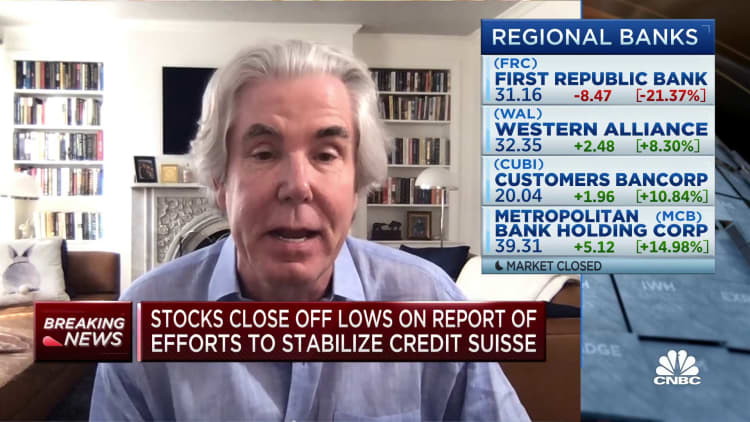Bank stocks were under pressure on Wednesday as the sharp drop of Credit Suisse rattled a segment of the market that was already reeling from two large bank failures in the past week.
Shares of the Swiss lender fell more than 20% after the chairman of its biggest backer — the Saudi National Bank — said it won't provide further financial support, even though it sees Credit Suisse as a strong bank and is happy with its turnaround plan.
After European markets closed, the Swiss National Bank said in a statement that it would provide additional liquidity to Credit Suisse if necessary. U.S.-listed shared pared some of their losses following the news and closed down about 14%.

Credit Suisse announced Tuesday it had found "material weakness" in its financial reporting process from prior years. Other European banks also slid, including a 6.8% drop for the U.S.-traded shares of Deutsche Bank.
The move appeared to be hitting large U.S. banks as well. Shares of Wells Fargo fell more than 3%, as did Goldman Sachs. JPMorgan shed 4.7%, while Citigroup slid 5.4%.

Some regional bank stocks saw even bigger declines. Shares of First Republic dropped more than 21% after its debt rating was downgraded by S&P Global Ratings and Fitch. PacWest Bancorp slid nearly 13%. Western Alliance saw steep losses in morning trading before reversing higher, continuing a volatile trend of trading in the stock.
Credit Suisse's struggles come on the heels of the collapse of Silicon Valley Bank and Signature Bank in the U.S. Those failures caused steep sell-offs in regional bank stocks on Monday. The SPDR S&P Regional Bank ETF (KRE) fell 1.6% on Wednesday.
While Credit Suisse's woes appear unrelated to mid-tier U.S. banks, the combination of the two issues could spark a broader reexamination of the banking system among investors, according to Peter Boockvar of Bleakley Financial Group.
"What this is telling us is there's the potential for just a large credit extension contraction that banks are going to embark on [to] focus more on firming up balance sheets and rather than focus on lending," Boockvar said Wednesday on CNBC's "Squawk Box."
"It's a balance sheet rethink that the markets have. Also you have to wonder with a lot of these banks if they're going to have to start going out and raising equity," he added.
In that vein, Wells Fargo on Tuesday filed to raise $9.5 billion of capital through the sale of debt, warrants and other securities. The bank said the new cash will be used for general corporate purposes.
The fallout from the collapse of SVB could also lead to more regulation and rising costs for the U.S. banking sector, including the potential for higher fees to regulators to pay for deposit insurance.


